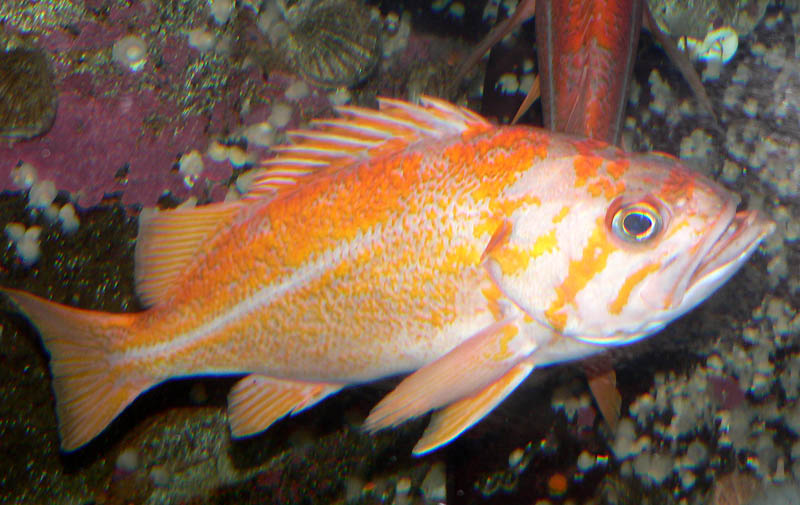|
| 질의: northern krill | 결과: 4번째/23 | |
Canary Rockfish (Sebastes pinniger) - Wiki
| 제목: | Canary Rockfish (Sebastes pinniger) - Wiki
| |

| 해상도: 800x505
파일크기: 118289 Bytes
촬영일: 2005:07:09 10:53:03
사진기: DMC-FZ20 (Panasonic)
F number: f/2.8
Exposure: 10/600 sec
Focal Length: 120/10
등록시간: 2007:09:20 18:11:53
|
Canary rockfish
From Wikipedia, the free encyclopedia
[Photo] Photo of Sebastes pinniger (canary rockfish) at the Vancouver Aquarium, taken July 2005 by Stan Shebs (http://commons.wikimedia.org/wiki/User:Stan_Shebs) | Permission is granted to copy, distribute and/or modify this document under the terms of the GNU Free Documentation License, Version 1.2 or any later version published by the Free Software Foundation; with no Invariant Sections, no Front-Cover Texts, and no Back-Cover Texts. A copy of the license is included in the section entitled "GNU Free Documentation License". |
The canary rockfish (Sebastes pinniger) is a rockfish of the Pacific coast, found from south of Shelikof Strait in the eastern Gulf of Alaska to Punta Colnett in northern Baja California.
As the name suggests, this rockfish is notable for a general orange-yellow appearance, consisting of a blotchy orange pattern over a whitish or light gray background. The head has three stripes angling downwards and back, the middle one generally running across the eye, and the other two on each side of the eye. The lateral line is in a clear area. The fins are orange, with the pectoral, pelvic, and anal fins somewhat pointed and larger (thus the species epithet pinniger, meaning "I bear a large fin"). Some individuals have dark blotches on the body or dorsal fin. Maximum recorded length if 76 cm (29.6 in).
Young canaries live in relatively shallow water, moving to deeper water as they mature. Adults are mostly found at depths of 80-200 meters (with two recorded at 838 meters), tending to collect in groups around pinnacles and similar high-relief rock formations, especially where the current is strong. Some off Oregon have been reported living over flat rock and mud-boulder bottoms. They may move considerable distances; one individual covered 700 km in four years after being tagged and released. Juveniles feed on small crustacea such as krill larvae (and eggs), copepods and amphipods, while adults eat krill and small fishes.
They have been an important commercial species since at least the early 1880s, with fisheries off San Francisco, California and Washington state. They are caught in trawling and hook and line operations, along with a variety of other fish such as as yellowtail, lingcod, and other rockfishes. The numbers have been declining in recent years, and canaries are classified as overfished.
http://en.wikipedia.org/wiki/Canary_rockfish
| The text in this page is based on the copyrighted Wikipedia article shown in above URL. It is used under the GNU Free Documentation License. You may redistribute it, verbatim or modified, providing that you comply with the terms of the GFDL. |
|
^o^
동물그림창고 똑똑전화 누리집
^o^
|
|

